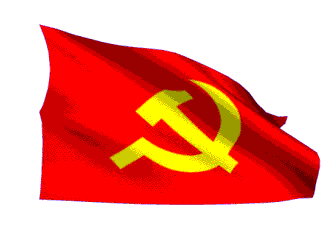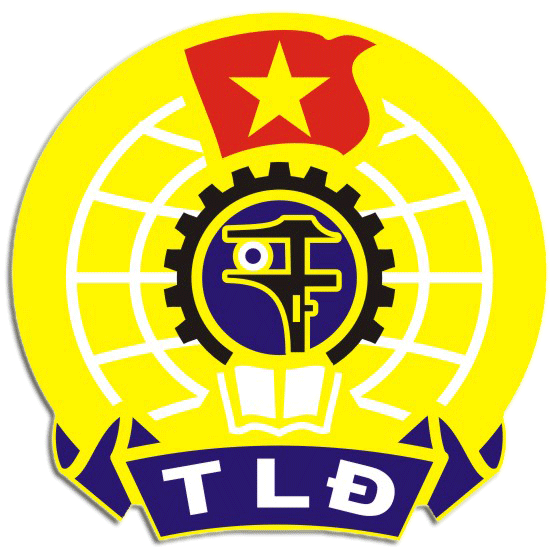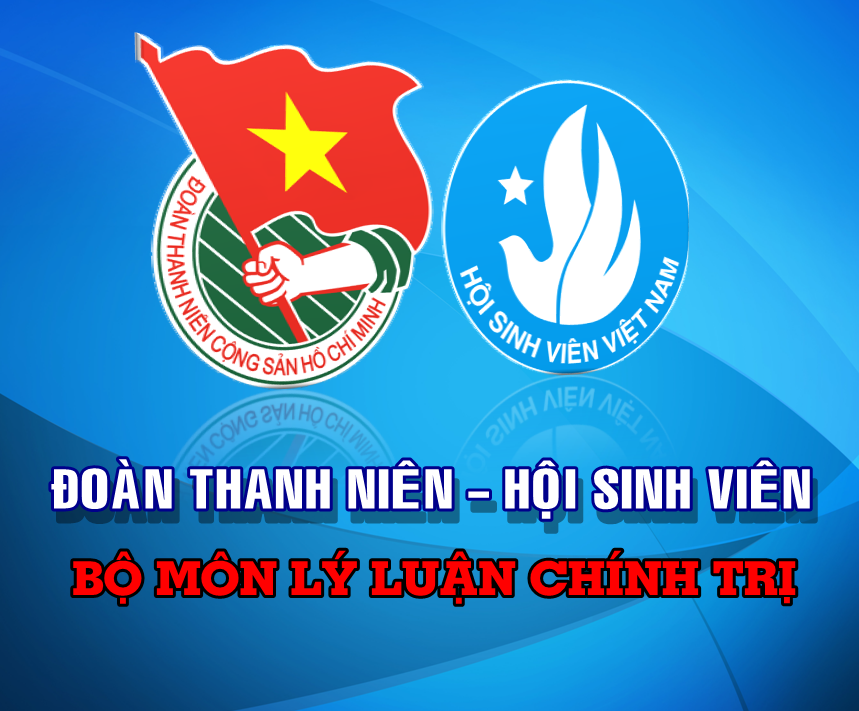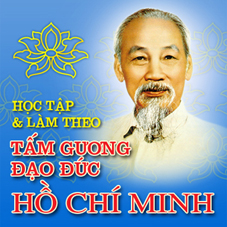- Giới thiệu
- Tra cứu điểm
- Mẫu biểu
- Giáo trình - Tài liệu
- Nhiệm vụ công tác trọng tâm
- Tuyển sinh
- Bài giảng và tài liệu tham khảo
- Ngân hàng câu hỏi và giới hạn ôn thi
- Giải đáp thắc mắc
- Ngoại khóa
- Công tác giáo viên chủ nhiệm
- Khen thưởng - Kỷ luật
- Cơ sở vật chất
- Thư viện ảnh/video
- Kỹ năng sống
- Văn bản pháp luật
Tài liệu xemina khoa học bằng tiếng Anh (14/10/2019)
ETHIC EDUCATION FOR YOUNG PEOPLE
IN THE "WILL" OF PRESIDENT HO CHI MINH
Duong ThiNhan
Faculty of Political Theory, Thai Nguyen University of Technology
SUMMARY
Abstract: President Ho Chi Minh's "will" is a document of a major politician, the highest leader of the Party and the people of Vietnam, and is both a great art work of a great cultural person and a highly-valuable document to the revolutionary process and the cause of building and defending the Fatherland in many aspects and figuring out the direction for the revolution of Vietnam. The work is the most consistent and condensed reflection of Ho Chi Minh's entire life, career, thought and last expectation. The thought of educating youth ethics in the Will expressly and profoundly expresses one of the core ideas of President Ho Chi Minh, is a great advice for the whole Party and people of Vietnam, a great and important task that we need to do after the country's reunification and in the cause of national construction in the new situation. The paper focuses on clarifying three basic contents of Ho Chi Minh's youth ethical education in the Will and pointing out the current meaning of thought.
Keywords: Ethical education, Youth, Will, Ho Chi Minh
1.Introduction
The development history of any nation, in any age, shows that young people are always considered the pillar and future of the country, looking at today's youth generation and knowing the future of the country. Therefore, young people play a decisive role for the development of the nation. As a person who devoted his life to the cause of fighting and liberating the nation, President Ho Chi Minh always saw the great strength and role of young people: The country is prosperous or poor, weak or strong partly because of the youth. Throughout Ho Chi Minh's life, he always cared about young people and focused on the youth development and education that spirit and those concerns expressed in the Will: "Fostering revolutionary generations for the next generation is a very important and very necessary task" [1]. Nowadays, before the strong development of the market economy, international economic integration, and the foreign ideological and cultural trends, etc., it has greatly affected the mind, emotions and the responsibility of the young generation of Vietnam for the construction and defense of the Fatherland at the new stage today. Studying and applying Ho Chi Minh's thought on ethical education for young people in the Will in Vietnam's new development conditions has both theoretical and practical implications.
2. Content
2.1. Fostering the revolutionary generation for the next generation is the crystallization of Ho Chi Minh's thought on future education for Vietnam
The will was started by Ho Chi Minh on May 10, 1965 with the title "Absolutely secret" with 3 typed pages, the last page was dated May 15, 1965, signed by Ho Chi Minh and Le Duan - First Secretary of the Central Committee of the Communist Party of Vietnam. The years 1965, 1968 and 1969 Ho Chi Minh continued to repair and supplement the will. At 10:00 am on May 19, 1969, to commemorate the 79th birthday, Ho Chi Minh read the last time all the wills that were revised and supplemented over the years, then put them the envelope and put away. Ho Chi Minh's will was first announced at Ho Chi Minh's funeral in September 1969. The ethical education for young people is one of the basic contents of Ho Chi Minh's Will, which is reflected in the following basic points:
First, the revolutionary ethical education for young people is especially important in the Will.The will is the intention, affection, spirit, faith and responsibility of President Ho Chi Minh to the Fatherland, the people and the revolutionary cause.The will succinctly and deeply reflects the innovative ideas of President Ho Chi Minh in the cause of building the country of Vietnam, stemming from the reality ò Vietnam, Ho Chi Minh advised the whole Party and the entire Vietnamese people about great and important things to do after the country's reunification, with special emphasis on moral education for young people.
At the beginning of the Will, Ho Chi Minh affirmed: "The resistance against America, saving the nation of our people despite having to go through hardships and sacrifices more, but definitely win completely", believing in the victory of the revolution of the nation, worried for the future of the country when "who knows I will serve the revolution, serve the country, serve the people for how long?", that's why "have a few words" in case to go to see Marx, Lenin and other senior revolutionaries were compatriots from the whole country, comrades in the Party and friends everywhere from feeling abrupt. Among the contents that the Will has emphasized: about the Party, about union members and young people, the working people, the resistance against America, about the world communist movement, about their own affairs, we can see the content about union members and the young people in second place. Want to do good Party's work: must have the core force that is the youth. When talking about the Party, President Ho Chi Minh emphasized the tradition of solidarity in the Party; requires broad, regular and rigorous democratic practices of self-criticism and criticism; every cadre and party member must really be imbued with revolutionary morality; and keep the Party really transparent.
Realizing that the core force of the Party, the next generation of revolution is the union members and the youth, to build a country, the party must be transparent and united, each party member must be imbued with revolutionary morality; to build the party, it is required to pay attention to educating the younger generation of unionists and young people - the right hand of the Party; therefore, Ho Chi Minh emphasized that after the victory of the resistance war, the country needs to be built under new conditions. All the Party and people must invest and take care of this core force.
Ho Chi Minh wrote: “OUR MEMBERS AND YOUTHS are generally good, everything is enthusiastically volunteering, not being afraid of difficulties and having progressive mind. The Party needs to take care of revolutionary ethics education for them, train them to be the heirs of the socialism building both "ethic" and "professional" characteristics"[2]. Ho Chi Minh stressed: "Fostering revolutionary generations for the next generation is a very important and very necessary thing" [3]. It is not only the care and attention for the revolutionary career, cultivating the root so that his father's career is always developed, but Ho Chi Minh's profound vision is also for the present and the future of sustainable development.
Secondly: Ethical education for union members and young people is the unified content throughout Ho Chi Minh's ideology. Not only President Ho Chi Minh's Will mentions about youth union members, emphasizes the role of young people in the cause of revolution, national construction and defense; affirms this is the Party's backup team and the future owner of the country; requires the Party to take care of fostering revolutionary morality for them but that ideology and that spirit are expressed uniformly in Ho Chi Minh's entire revolutionary career.
Firstly, Ho Chi Minh recognizedthe role and great power of young people in the revolutionary cause of the nation, and was deeply aware that, “A year begins in the spring. A life begins from the youth. Youth is the spring of society” [4]; therefore, from very early, Ho Chi Minh highly appreciated the role of the younger generation - those who bring in their enthusiasm, full vitality, energy creativity, etc. to the longevity of the country. In 1925, in his work "The judgment of the French colonial regime", Ho Chi Minh appealed: "Poor Indochina! will die, if the group of old young people does not soon revive ”[5], that message was like a wake-up call to wake up the nation, thereby attracting a large number of patriotic young people to Vietnam to follow the revolutionary path. Ho Chi Minh always believed and clearly saw the position and responsibility of young people as "future owners of the country, always believes and recognizes young people from the perspective of future development of the nation and the glorious nation's future are in the hands of young people. In the early years after our country gained independence, President Ho Chi Minh stated: “The country is prosperous or weak, weak or strong in large part because of the youth. Young people who want to take charge of the future are worthy, right now to train their spirit and force to work to prepare that future ”[6]. Moreover, Ho Chi Minh also emphasized that young people must participate in the government's work, fight for independence and train themselves from now on in order to later replace the leaders who shoulder important affairs of the country.
Secondly, Ho Chi Minh loved young people who hold the fate and future of the country. In his speech at the 2nd National Conference of the Vietnam Youth Union, Ho Chi Minh emphasized: "I really love young people" [7] because according to Ho Chi Minh "young people are the revolutionary force for the old generation of young people, and they are also the person who is in charge of guiding the future young generation - young children” [8]. President Ho Chi Minh was well aware of the role of young people on both social dimensions and the relationship between the past and the inseparable future. This role is crucial to the destiny of the nation and the working class. Furthermore, he loved young people "because young people are a volunteer in the cause of economic and cultural development, in the cause of socialism building" [9], and emphasized "Because in everything, young people emulated to implement the slogan: “Where there is a need, young people will appear; where there is difficult task, young people will do” [10]; Because young people are the basic force in the army, the police and the militia are enthusiastically keeping the order and security and national defense. With infinite love for young people, President Ho Chi Minh always sees young people from a developed and comprehensive perspective. According to Ho Chi Minh, young people who live in new conditions inevitably have different needs and interests from their fathers and cousins, so instructing cadres and party members need to avoid prejudice, narrow and conservative attitude for young people, it is not advisable to consider young people rigidly. To understand young people, according to Ho Chi Minh, it is necessary to go into life, understand the psychology of young people and help them solve problems practically.
Thirdly, Ho Chi Minh is always concerned about the youth work. From recognizing the decisive role of young people for the revolutionary career and the future of the nation, Ho Chi Minh paid special attention to the youth work. According to Ho Chi Minh, to implement the content and purpose of the youth work, there is no other way is to educate and organize the youth, it is important to organize the youth into a powerful political force around the Party. The youth organization and gathering is a condition for education and vice versa, conducting training and education of youth through the organization. To this end, it is necessary to persist in building a youth organization as the Party's arm and reserve team. To attract young people to strive for the communist ideology, Ho Chi Minh founded and trained the Youth Union organization, through the process of formation and development until December 1976, officially named the Ho Chi Minh Communist Youth Union. With the goal of "planting trees for the sake of ten years, planting people for the sake of a hundred years", after winning the government, President Ho Chi Minh led the State to formulate appropriate youth policies with each revolutionary period, regularly attaching importance to and educating and guiding the young generation of Vietnam, directly organizing training and training activities, and setting an example of every aspect for the younger generation to study and follow. President Ho Chi Minh regularly advised to strive to unite and gather young people into a large front. President Ho Chi Minh City required the delegation to research and find out appropriate forms and methods to both attract young people to participate, at the same time, be firmly oriented, clear and stable striving goals and growth prospects to unite and organize youth broadly and firmly. Accordingly, in order to strengthen and develop the Youth Union, we have to connect extensively and closely with the young people, pay attention to the working and studying life of young people, develop the union members in number, and attach importance to the improvement of the quality; therefore, when admitting the members, it is necessary to carefully select good young people.
President Ho Chi Minh always put his faith and expectation in young people and made forecast: With a generation of energetic youth, we are bound to succeed in the cause of defending the North, liberating the South, and reuniting the country; this is really true when Vietnam is growing and empowering in the international arena.
Thirdly, the revolutionary ethical education is both "ethic" and "professional" characteristics for young people.Stemming from the ideal and determination to fight for the cause of national liberation and liberation throughout the life, Ho Chi Minh's highest and most sacred aspirations: "I have only one desire, the ultimate desire, to make our country completely independent, our people to be completely free, everyone has food, clothing, and everyone can study.” [11] and "Nothing is more precious than independence and freedom", which transmitted that enthusiasm and spirit to the Vietnamese people, especially the youth. In order to do the revolution, young people must be educated with revolutionary morality, "to build socialism, there must be socialist people, that is, there must be socialist moral people" [12]. To master the country in a new age, young people need to be educated to become good citizens, good workers and good soldiers. To do so, young people need to be equipped with revolutionary morality, only when they are equipped with true revolutionary ethics, young people can strive to improve themselves, thereby forming their personal capacity as a premise to complete the glorious revolutionary mission. In that sense, revolutionary ethics is a solid foundation for young people to fulfill their glorious tasks. In the Will, Ho Chi Minh particularly emphasized: "The Party needs to take care of revolutionary ethics for them, train them to be successors to build socialism that is “ethic” and “professional” [13] or in other words, “virtue” and “talent” at the same time.
Understandably, the overarching content of President Ho Chi Minh's youth work is to form a class of successors to build socialism to ensure both virtue and talent. In order for our young generation to become the successors of building socialism both "ethically" and "professionally", education must proceed in a holistic manner, paying attention to both religious factors of virtue and talent, in which morality is the root. If "profession" is understood to be a high level of professionalism in the level of politics, culture, science, technology and military, "ethics" is understood as "a lifelong determination to fight for the Party and for the revolution. That is the key point". The revolutionary ethic education for young people here includes the following qualities:
Firstly, to be loyal to the country of filial piety to the people, that is, to be absolutely loyal to the Party and the people, determined to strive for the Party's life, the revolution, and wholeheartedly serve the people. This is the most important issue that Ho Chi Minh was interested in revolutionary education for young people. Being loyal to the country, first of all, the passionate and profound patriotism is expressed in the thoughts and daily actions of every young man, for the sake of the Fatherland. Being loyal to the Party, according to Ho Chi Minh means educating young people to be honest, upright and not doing bad deeds. At the time of being assigned the job, any small or big effort should be careful, effective and know to work in a beneficial way to avoid doing harm to the Party. It can be said that the consistent thought in Ho Chi Minh's thought that the Fatherland is always associated with the people, patriotic or loyal to the country and how to make "the people rich and strong". Being pious to the people is to educate the young to love their children, to love the people, to respect the people, to study, to work, to fight for the people, to make everyone have food and clothing and be educated. To take care and protect the interests of the people, overcome all difficulties in life to develop production and improve life. At the same time, have an attitude of respect for all people, altruism for the shortcomings and shortcomings of others, daring to fight against all manifestations of harassment of the people, always relying on the people to launch emulation movements labor production, making people excited and believe in the socialist regime.
Secondly, have the spirit: hardworkingness, thrift, integrity, righteousness and impartiality: Hardworkingness means hard-working, diligent, disciplined, efficient workers. Thrift means saving time, labor, money of the people and the country. Integrity is pure, ungreedy, rich and clear. Righteousness means straight, not bullying, not being arrogant, do good things and avoid evil things. Impartiality means when doing anything that does not think of you first, when enjoying it, you should go after. In a talk with students at the Vietnam People's University, on January 19, 1955, Ho Chi Minh reminded, young people need to fight self-seeking psychology and only care for their own interests and activities. Fight against psychological desire and avoid hardship; against contempt for labor, especially manual labor; anti-lazy, luxury; anti-mushy way of life; against arrogance, deception, bragging, etc., these are bad habits that inhibit the progress of young people. According to Ho Chi Minh, young people also need to build for themselves 5 points: always cultivate revolutionary morality, humility and simplicity; prevent complacency and pride; against waste and luxury. At the 3rd National Delegation Congress of Vietnam Youth Union, Ho Chi Minh pointed out: "Individualism is everything for the sake of their own interests regardless of the collective interests of" As long as we are fat, don’t care about thin people ". It is the mother who gives birth to all bad natures like: laziness, decadence, arrogance, bugle, shyness, waste, embezzlement, etc., it is the evil enemy of the revolutionary morality and socialism” [14]. Young people must constantly strive and sacrifice for the Fatherland. In an interpersonal and social relationship, Ho Chi Minh required young people to ask themselves what they have done for their country and do not to ask what their country has given themselves. Educate young people who have love and responsibility for everyone. Young people must regularly practice self-criticism and critical critique to help each other progress together.
Thirdly, have a pure international spirit: It is the spirit of solidarity between the Vietnamese people and international friends, for happiness, justice and social progress, against narrow nationalism, racism or hegemony. For Ho Chi Minh, young people are the future owners and workers of the country. To master well, young people must first have the ability to master. Ethical learning and training are the key to having the capacity to master and have the capacity to organize a new life. Therefore, training revolutionary morality for young people is particularly interested by Ho Chi Minh. Right from his departure to find a way to save the country, until before going away, Ho Chi Minh was interested in training his morals and taking care of education, building revolutionary morals for cadres, party members and the people. According to Ho Chi Minh, morality is the foundation of the revolution, as well as the root of the tree, the source of the stream, “The revolutionary must have morality, without morality, no matter how talented he is, he cannot lead the people.” In his speech at the second Vietnam Student Conference, Ho Chi Minh emphasized, “Young people are now a glorious generation, so they must voluntarily revise their ideas automatically to deserve your duty. That means young people must have virtue and talent. Having talents without virtue is like a man who is a very good financial economist, but defalcating, he is unable do anything to benefit society, but also harmful to society. If there is virtue without talent like Mr. Buddha does no harm, but it is not beneficial to the people” [15]. For every young man, Ho Chi Minh required to instill the spirit of mastery of the country, in order to study and cultivate revolutionary morality, because: “Just like a river, there is a new source of water. Without a source, the river runs dry. Trees have to have roots, without roots, the trees wither. Revolutionaries must have morality, without morality, even if they are talented, they cannot lead the people” [16]. Not only interested in practicing revolutionary morality, Ho Chi Minh also reminds him to regularly cultivate morality, if moral cultivation is not done often, it is very likely: A people, a party, and every human being, yesterday was great, had great attraction, not necessarily today and tomorrow and will still be loved and praised, if the heart is no longer pure, if you fall into individualism.
It can be said that if Ho Chi Minh's whole life strives to sacrifice for the independence and freedom of the nation, he will also love and take care of education and training for the future generations of the people, core generation, and vanguard of the Party. That spirit is a great concern and great concern for Ho Chi Minh's entire career which is clearly showed in the Will: "Each party member and official must be truly imbued with revolutionary morality" and: "The Party needs to take care of revolutionary ethics education for them (union members and young people), train them to be heirs of socialist society with both "ethic” and “professional” characteristics.
2.2. Implication of Ho Chi Minh thought on educating Vietnamese youth today
The law of development of human history as well as of any nation follows a continuous flow, generation after generation, so it is inevitable to pay attention to the cause of education and fostering the next generations. Throughout his career, Ho Chi Minh has paid great attention to the younger generation, considering the younger generation to be an important factor in determining the destiny and future of the country, that spirit has been the Communist Party of Vietnam to be applied to the education and fostering of young Vietnamese generations suitable to each stage of development of the country.
Vietnam is always aware that young people are a great social force, one of the important factors determining the future and the destiny of the nation and the people.Therefore, throughout the country's development period, Vietnam has always appreciated the right position and important role of young people, putting their faith in youth, "regularly taking care of, educating, fostering and creating favorable conditions for young people to strive to form a new generation of human beings with high ideals, a sense of civic responsibility, knowledge, good health, good labor, and cultural living and gratitude, rich patriotism and a genuine international spirit” to educate and foster the youth organization into a force of force, loyalty and succession to the cause of the country.Therefore, the youth work has always been identified as a priority task for the Party and the political system. Since the renovation (1986) up to now, the Vietnamese Communist Party has issued 3 thematic resolutions on the youth work. On February 9, 1991, the Politburo issued Resolution No. 25 - NQ/TW on renovating and strengthening the Party's leadership over the youth work. The resolution is of special importance, which is the starting point for the Party's renovation policy on the youth work in the renovation period. In 1993, the Resolution of the Fourth Conference of the 7th Party Central Committee was promulgated as a breakthrough and fundamental change in the awareness and guidelines of the Party towards the youth work. The Resolution specified: "Youth work is a vital issue of the nation, one of the decisive factors for the success or failure of the revolution”. Continuing to affirm the great and important role of young people for the future of the nation and the precursors of the Vietnamese revolution, in July 2008, the Party Central Committee issued Resolution No. 25 - NQ/Central Committee on strengthening the Party's leadership on the youth work during the period of accelerating the industrialization and modernization, the Resolution stated: “Young people are the pillars of the country, the future owners of the country… are the decisive factors for the success or failure of the cause of the industrialization, modernization of the country, international integration and the construction of the socialism”. The charter of the Communist Party of Vietnam (Article 44) defines:“The Ho Chi Minh Communist Youth Union is a trusted reserve team of the Party, regularly replenishing the young forces for the Party, continuing the glorious revolutionary career of the Party and President Ho Chi Minh; is the core force in the youth movement; is a socialist school; rights representative of youth; and is in charge of the Ho Chi Minh Youth Team. Today, the situation in the country and in the world has many changes, requiring Vietnamese people, especially the young generation, to be aware of their roles, positions and responsibilities in the cause of national renovation, construction and defense of the Fatherland in a new situation. At the Fourth Central Conference (Session VII), the Communist Party of Vietnam affirmed: Whether the renovation career will succeed or not, whether the country of Vietnam entering the 21st century has a worthy position in the world community or not, whether the Vietnamese revolution will follow the socialist path depends on whether or not youth force.
It can be seen that Vietnam's revolutionary practice has proved that the young generation in Vietnam always deserves the trust of the Party, the State and the people. They are truly a pioneer force in the revolutionary career. Throughout history, many advanced examples in combat, labor, study and work have belonged to the youth of Vietnam. In the current period of integration and development of the country, Vietnamese youth still assert that they are enthusiastic forces, leading in the implementation of programs and goals of the renovation cause, notably the two big movements: "Young people set up their businesses", "Young people defend the country", are conducted specifically in four action programs: "Establishing yourself, establishing a business, building a prosperous country", "Defending the Fatherland, maintaining order and security", "Improving people's intellectual standards, fostering young talents, developing culture and sports" , "Social work, environmental protection", etc. have attracted millions of young people to participate, be creative, contribute to the country and train themselves. However, besides the great achievements that Vietnamese youths contribute to the country, in fact, the quality of a part of the youth is still limited, many young people are still confused and confused in the awareness of Vietnam's opportunities and challenges in new development conditions. More concerning, a significant portion of Vietnamese young people have not been active in learning, practicing, not participating in the activities of mass organizations and social organizations, gradually degenerating and having a eroding lifestyle, getting entangled in social evils, etc., causing serious consequences for oneself, family and society.
In order to form an elite youth class, succeeding in the revolutionary career of the Party and people, Vietnam pays special attention to fostering, educating and training the young generation - a “very important and necessary” task as Ho Chi Minh advised in the Will. To do that, Vietnam is focusing on some of the following basic issues:
Firstly, to overcome the skepticism, confusion, wavering, fading of goals, revolutionary ideals, and reduction of faith in the Party's leadership in a part of young people, Vietnam is particularly interested in the education, fostering of revolutionary ideals, and the youth's individual responsibility for the goal of national independence attached to the socialism. The young generation of Vietnam is acutely aware of the value of national independence and freedom and happiness for the people in order to maintain their faith and be consistent with the ideal goal that the Party and President Ho Chi Minh have chosen. Vietnam persists in building a generation of Vietnamese young people who are rich in patriotism, self-reliant for the nation, persistent in the ideals of national independence and socialism, have revolutionary morality, sense of observance of discipline, live with culture, capacity, bravery in international integration, health, knowledge, skills and industrial working style, and become good citizens of the country.
Secondly, Vietnam is entering the period of industrialization, modernization and extensive international integration; facing new opportunities and challenges of market mechanism, Industry 4.0, education, training, science and technology have strong advantages in competition and development; therefore, Vietnam considers focusing on improving the political, academic, professional and scientific qualifications for the young generation. In the current period, Vietnam focuses on educating and fostering Marxism-Leninism, Ho Chi Minh's ideology, morality and style; educating on the Party's lines and policies and the State's laws with appropriate contents and methods, contributing to the development of dialectical thinking, raising the sense of responsibility and political bravery, voluntarily acquiring knowledge about economics, science - technology, culture - society, mastering science, technology and modern techniques, proceeding to be proactive and creative to reach out and master new things in international integration and globalization trend, gradually overcoming the perverted and superficial awareness about apprenticeship, career selection, career orientation in a part of young people, pupils and students at present.
Thirdly, Vietnam always pays attention to building a positive and favorable social environment for young people to develop and improve their personalities and have conditions to contribute much to the country; comprehensively take care of the physical, spiritual life and legitimate needs and interests of the youth such as the need for study, training, employment, and entertainment needs; actively innovating the form of ideological political education and associating theory and practice. In particular, Vietnam always attaches great importance to young talents, creating a breakthrough in the arrangement and use of young cadres in all fields, young-age cadres at all levels and considering it an important content about cadre work to select leaders for the future.
3. Conclusion
President Ho Chi Minh's will is an extremely valuable document for the process of revolution and the cause of building and defending the Vietnamese Fatherland in many aspects, pointing out the direction for the Vietnamese revolution for both today and the future. Along with the basic contents of the Will, the thought of fostering revolutionary generations for the next generation is a very important and essential task, which still has great value in theory and practice.The will is a document of a great politician, the highest leader of the Party and people of Vietnam and both a great work of art of a great cultural person. This is the most consistent and condensed reflection on the whole life, career and thought of President Ho Chi Minh. The thought of educating youth ethics in the Will expressly and profoundly expresses one of the core ideas of President Ho Chi Minh, is a great advice for the whole Party and people of Vietnam, a great and important task that we need to do after the country's reunification and in the cause of Vietnam’s national construction in the new situation.
NỘI DUNG BÁO CÁO XEMINA TIẾNG ANH
Truong Vu Long
Faculty of Political Theory, Thai Nguyen University of Technology
Attractive destinations in Thai Nguyen
Thai Nguyen is famed for its tea, but the province has many other natural attractions still pristine.
Thai Nguyen is virtually a synonym for tea in Vietnam, and this seems to have kept several other beautiful places in the northern province away from the tourism spotlight. Just 80 km from Hanoi, the province is a gateway(3) to the beautiful northeastern part of the country, including Ha Giang, Ba Be Lake in Bac Kan and Ban Gioc Waterfall in Cao Bang on the China-Vietnam border. But it is best known for producing the nation’s finest teas. Before 1882, tea was grown by local famers in highland areas and valleys surrounded by giant mountains.
Then, about half of harvested leaves were used for drinking fresh tea, and the rest was processed and preserved. In 1882, the French began establishing huge tea estates and using machines and modern cultivation techniques that saw output soar. The province started growing black tea for the Western European market and Chinese green tea for Northern Africa on an industrial scale.
Around 16 km to the west of downtown Thai Nguyen, the Nui Coc Lake stands pristine thanks to its low profile. This 25 square kilometer lake is associated with the legendary(4) love story of Coc, a boy from a poor family and Cong, a girl from a rich mandarin(5) family. Despite being deeply in love with each other, they were not allowed to marry each other due to the difference in their social status Coc played the flute to call Cong to his room, but she was not allowed to leave the house to meet him. Coc waited for his lover until he died and turned into the Coc Mountain. Meanwhile, Cong cried day and night after she heard of her lovers’ fate(6). Her tears seeped to the ground and started flowing as a stream called the ‘Cong’ River. Nui Coc Lake has 89 islets of several shapes and sizes rising from its emerald waters. It is sometimes called ‘the miniature Ha Long Bay.’ Tourists can take a boat trip to visit these islets and discover a 200-year old house on Nui Cai Islet which has some precious artefacts.
Cua Tu, literally translated as the Death Gate, has been overlooked by tourists and trekkers for years due to its secluded location. It gets its name, locals say, because there is only one path up and down. At Cua Tu, cliffs and white water runoffs amidst mountains and forests combine to make a beautiful and challenging landscape. The name Cua Tu is rooted in a legend about a faithful couple willing to overcome all difficulties to be together. Around 45 kilometers from downtown Thai Nguyen, Cua Tu is a good place for those who enjoy the adventure of exploring a new place.
However, trekkers should take advice from tour operators or contact local residents to ensure a safe trek.
-
18, Tháng 5, 2022
-
14, Tháng 5, 2022
-
10, Tháng 5, 2022
-
5, Tháng 5, 2022
-
30, Tháng 4, 2022
-
30, Tháng 4, 2022
-
10, Tháng 5, 2022
-
18, Tháng 5, 2022
-
14, Tháng 5, 2022
-
5, Tháng 5, 2022








